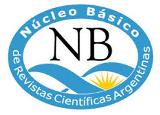Regulated prostitution, sexual morality and patriarchal family in Junín, Province of Buenos Aires (1891-1936)
DOI:
https://doi.org/10.24215/23139048e011Keywords:
Female prostitution; regulation; patriarchal family; JunínAbstract
This article addresses the situation of regulated female prostitution, the conceptions about it and the control of its exercise by the state authorities of the Buenos Aires town of Junín. It is analyzed in terms of its relationship with the patriarchal family model that different sectors tried to impose in the country between the late nineteenth and early twentieth centuries. In this period it acquired a series of specific features and a marked relevance due to the dimension and characteristics of the development traversed by the country and, particularly, the locality. For a series of strongly rooted conceptions at the time was conceived as a fundamental activity for the maintenance of a specific social order and gender, but which in turn embodied some dangers. Therefore, it was decided to regulate it through the municipalities, focusing mainly on moral, hygienic and security aspects.
Downloads
References
Published
How to Cite
Issue
Section
License
The acceptance of an original by the journal implies the non-exclusive transfer of the economic rights of the authors in favor of the editor, who allows reuse, after editing (postprint), under a Creative Commons Attribution License -NonCommercial-ShareAlike 4.0 International (CC BY-NC-SA 4.0)
In accordance with these terms, the material can be shared (copied and redistributed in any medium or format) and adapted (remixed, transformed and created from the material another work), provided that a) the authorship and original source of its publication (magazine and URL of the work), b) is not used for commercial purposes and c) the same license terms are maintained.
The transfer of non-exclusive rights implies that after its publication (postprint) in Cuadernos de H ideas the authors can publish their work in any language, medium and format; in such cases, it is requested that it be stated that the material was originally published in this journal.
Such assignment also implies the authorization of the authors for the work to be harvested by SEDICI, the institutional repository of the National University of La Plata, and be disseminated in the databases that the editorial team considers appropriate for increase the visibility of the publication and its authors.
Likewise, the journal encourages the authors so that after their publication in Cuadernos de H ideas they deposit their productions in other institutional and thematic repositories, under the principle that offering society scientific and academic production without restrictions contributes to a greater exchange of global knowledge.










.png)

























